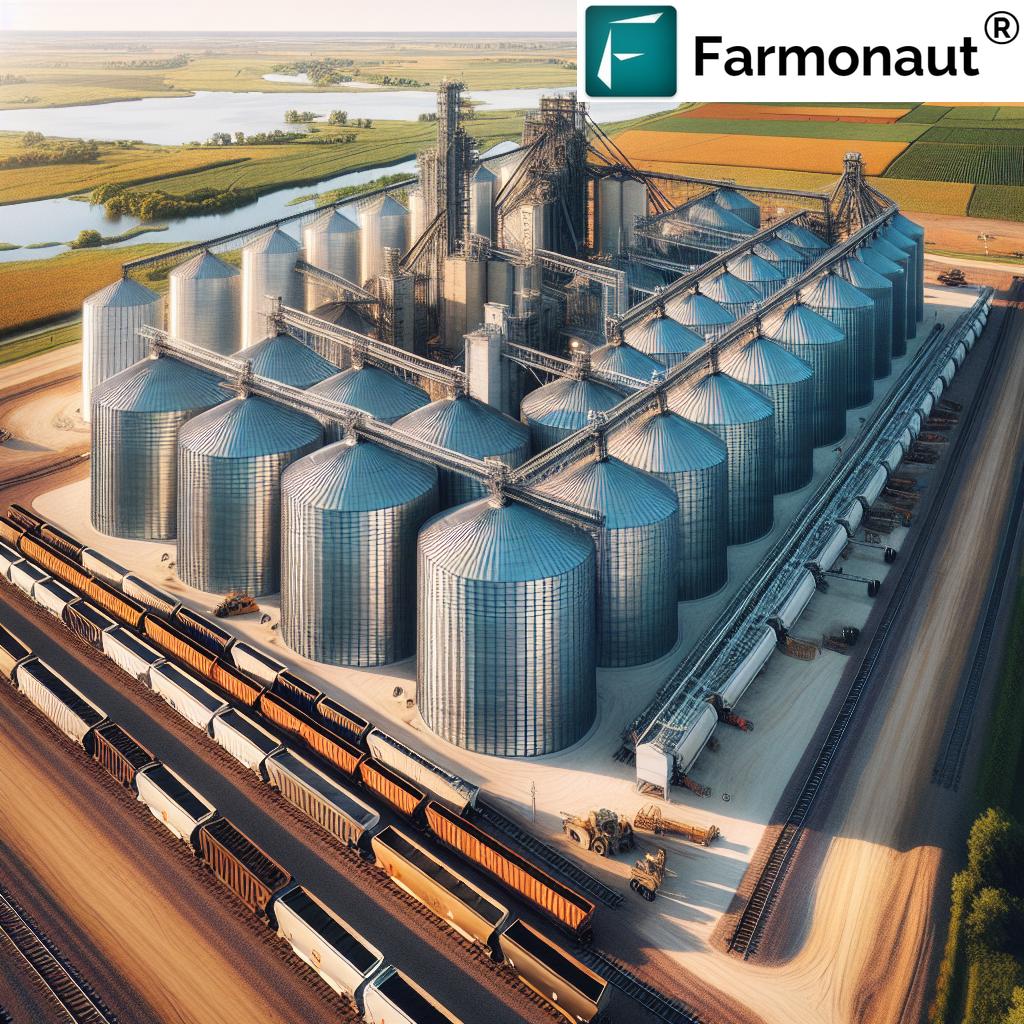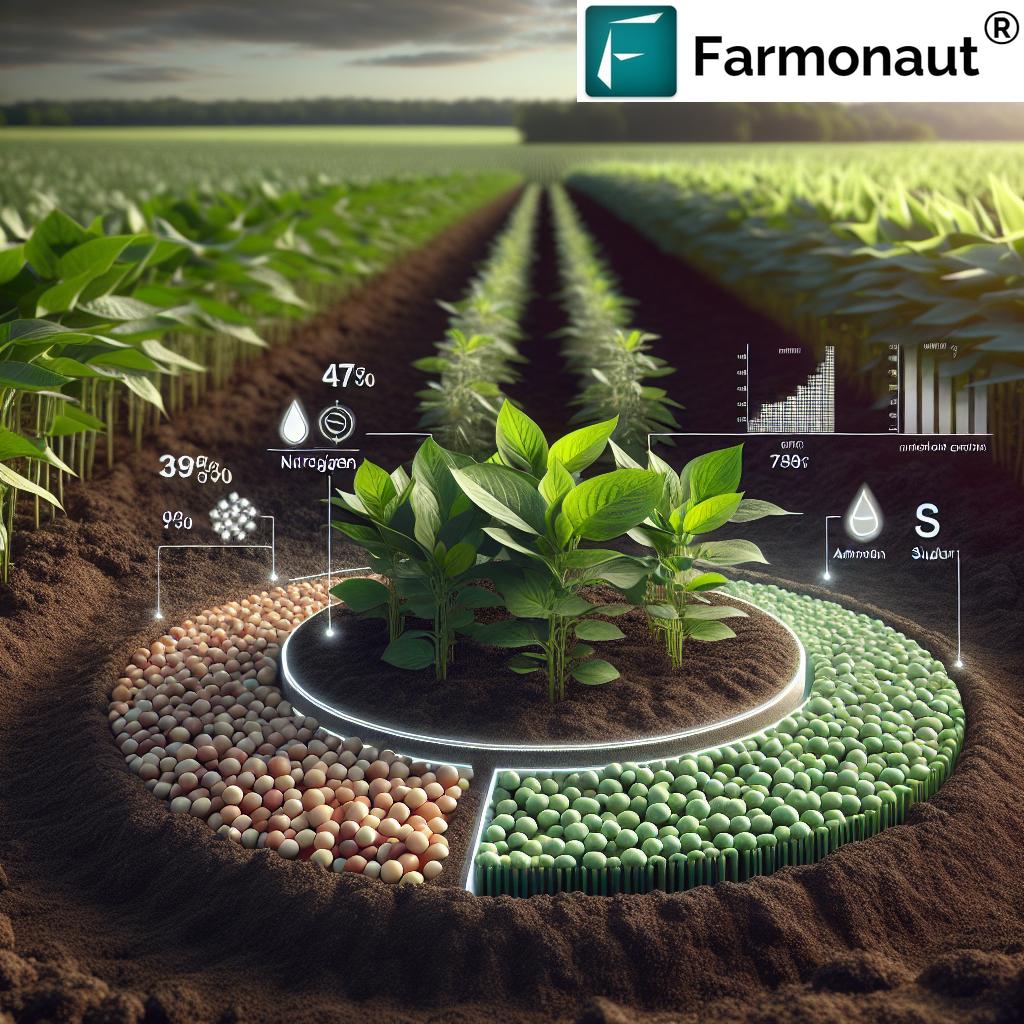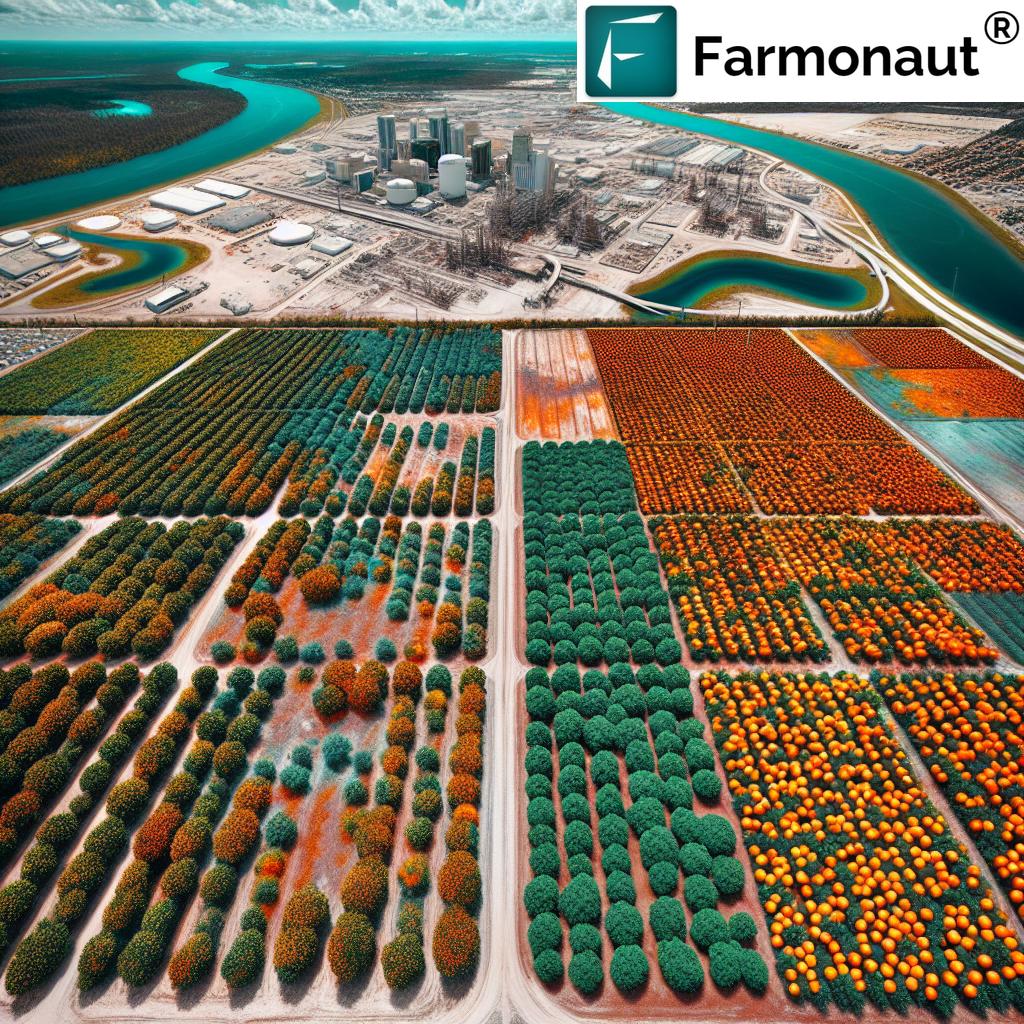American Farm Company & Seed Companies: 2026 Trends – How U.S. Agriculture Leads Sustainability
“By 2025, over 60% of American farm companies are projected to adopt advanced seeds for improved sustainability.”
Table of Contents
- Introduction: The Role of American Farm Companies in 2026
- The Evolution of the American Farm Company
- American Seed Companies & The Seed Science Revolution
- American Cow Breed Genetics: Transforming Livestock Sustainability
- Farmland Trusts & Land Conservation: Preserving the Backbone
- Renewable Energy Integration: American Wind Turbine Companies on the Farm
- Data, Satellite, & Tech: The Digital Future with Farmonaut
- Comparison Table: Sustainability Innovations by Leading American Farm & Seed Companies (2026)
- The American Farm Bureau’s Advocacy for Resilient Agriculture
- Shaping the Future: 2026 Trends and Beyond in American Agriculture
- FAQ: All About American Farm Companies, Seeds, and Sustainability
- Conclusion: Building a Sustainable and Resilient Agricultural Ecosystem
Introduction: The Role of American Farm Companies in 2026
In 2026, the strength and stability of the American farm company network continue to secure the nation’s place as a leader in sustainable and innovative agriculture. As the world grapples with rising food demand, unpredictable climate change, and environmental concerns, American farm companies are increasingly taking pivotal actions. These companies—ranging from leading seed producers to livestock breeders, technology service providers, and renewable energy solution suppliers—form an ecosystem that not only sustains rural communities but also sets global standards in food security and environmental stewardship.
As we look toward 2026 and beyond, the merging of innovation with tradition is more evident than ever. American seed companies, livestock genetics innovators, farmland trusts, and wind energy firms are collaborating—directly and indirectly—to ensure farms are resilient, sustainable, and equipped to meet today’s and tomorrow’s challenges.
This article offers a comprehensive look at the American agri-sector’s 2026 trajectory, spotlighting the ongoing transformation driven by advanced technologies, resource management, renewable energy integration, and data-enabled services such as those offered by Farmonaut. We’ll dive into the current state and future direction of:
- American farm company restructuring and innovation
- The rise of advanced seed technologies from top American seed companies
- Breakthroughs in American cow breed genetics and sustainable animal agriculture
- The role of American farm land trust organizations in conservation
- How energy—especially from wind turbines—is being harnessed for farm sustainability
Through this exploration, we’ll clarify how American agriculture continues to lead, adapt, and set examples for a sustainable future.
The Evolution of the American Farm Company
The concept of the American farm company has transformed dramatically over the last decade. Where once farming was seen as the dominion of multi-generational families managing traditional row crops or livestock, today’s American farm company is far more diverse, professionalized, and technologically advanced. Companies now range from independent crop producers and family-owned livestock operations to vertically integrated agribusinesses, precision farming technology firms, and corporate service providers.
In 2026, the backbone of American agriculture rests on these companies’ ability to identify, adapt to, and lead innovation—all while maintaining the integrity and tradition that are characteristic of rural communities and farmland values. This balancing act revolves around clear pillars:
- Resilient and adaptive seed technologies
- Genetically improved livestock breeds
- Land and resource conservation practices
- Integration of renewable energy sources
- Data-driven monitoring and operational optimization
The ability to continue thriving in an increasingly complex ecosystem is a testament to the vital role these companies play in shaping the future of the American nation and global food systems.
Key Characteristics of Today’s Leading American Farm Companies
- Deep commitment to sustainability and land management for economic, social, and environmental resilience.
- Adoption of advanced genetics and biotechnology in both plant and animal operations to meet market and environmental demands.
- Continued integration of renewable energy and digital monitoring for lower costs, increased productivity, and lower carbon footprints.
- Establishment of partnerships with farmland trusts, advocacy organizations, and tech companies to address development pressures and climate change.
With this foundation, let’s explore the crucial components of this evolving agricultural ecosystem, starting with the science behind seeds.
American Seed Companies & The Seed Science Revolution
If American agriculture is an intricate machine, seeds are its gears. American seed companies are the force driving forward resilience and productivity by developing crop varieties that are high-yielding, resilient to climate stress, and less dependent on chemical inputs.
By 2026, the adoption of advanced seeds—especially for corn, soybeans, and wheat—is nearing universal levels, with estimates showing over 60% of all U.S. farmland planted with genetically improved and climate-adaptive seeds. Seed companies have utilized molecular breeding programs, gene editing, and biotechnology to:
- Enhance drought and pest resistance while still prioritizing flavor, nutrition, and quality.
- Enable farmers to maintain yields despite unpredictable weather conditions.
- Reduce the need for synthetic fertilizers and crop protection chemicals, thus supporting farmland and ecosystem health.
Case in Point: Drought-Tolerant Corn & Soybeans
American seed companies at the forefront have successfully released lines of corn and soybeans capable of using less water and still delivering strong yields, even during extended dry periods. Developments like gene-edited traits for root optimization or enhanced photosynthetic efficiency are becoming common in commercial seed catalogues.
The result? Not only are farmers less vulnerable to less predictable weather and climate volatility, but the land itself is under less pressure to deliver, reducing stress on water tables and surrounding ecosystems.
For farmers wishing to maximize the efficiency and traceability of their crops, blockchain-based traceability tools—like those provided by Farmonaut—are now an important resource. These tools ensure that every step, from seed selection to harvest, is documented and traceable, increasing transparency, food safety, and alignment with evolving marketplace demands for responsibly grown food.
Today, American farm company strategies are incomplete without the inclusion of advanced genetics, transparency, and digital traceability across the agricultural value chain.
American Cow Breed Genetics: Transforming Livestock Sustainability
Alongside crop innovation, American cow breed genetics have advanced rapidly in the past few years, further reinforcing the nation’s ability to supply the world with high-quality beef and dairy products while simultaneously respecting the need for sustainable farming practices.
Breeds like Angus, Hereford, and Holstein have been selectively bred for trait optimization across disease resistance, feed efficiency, meat yield, and milk quality. Modern American farm companies involved in cattle breeding now use genomic tools and data analytics to:
- Accelerate genetic improvements across entire herds;
- Ensure herds are healthier and more productive;
- Reduce environmental impact by selecting for traits like lower methane production and enhanced feed-to-milk or feed-to-meat ratios.
These advances directly benefit farmers economically but also respond to the consumer demand for higher animal welfare, traceability, and quality assurance in both beef and dairy supply chains. Blockchain-based traceability—supported by platforms such as Farmonaut—enables robust verification of genetic lineage and animal welfare credentials.
“Renewable energy use on US farms is expected to increase by 35% by 2026, boosting resilient agriculture practices.”
Focus on Breed Diversity and Resilience
In 2026, American farm companies are investing in multi-trait, multi-breed herds. This means not just relying on a single cow breed, but leveraging hybrid vigor and crossbreeding for further resilience. This strategy supports continued productivity regardless of shifting disease pressures, climate influences, or consumer trends.
The benefits of these breeding programs extend beyond productivity:
- Reduced disease risk through genetic diversity
- Improved land use via targeted feeding and rotational grazing systems
- Economic viability through premiums for certified, traceable, and high-welfare animal products
Farmland Trusts & Land Conservation: Preserving the Backbone
As America’s rural populations fluctuate and urbanization continues, American farmland trusts play an increasingly vital role in protecting agricultural lands from being lost to infrastructure development and non-farm use. These trusts work directly with farmers, municipalities, and policy makers to:
- Implement conservation easements that keep land available for farming in perpetuity;
- Support sustainable land management practices including cover cropping, rotational grazing, and biodiversity enhancements;
- Preserve soil health, water resources, and the overall ecosystem, ensuring farming can continue sustainably for future generations.
A key part of these efforts is their focus on the triple bottom line: productivity, environmental health, and rural economic sustainability. Increasingly, American farm companies and seed companies are partnering with or taking cues from these land trusts to align their management practices with conservation priorities.
In supporting and following recommendations from trusts, companies defend the long-term economic viability of American agriculture.
Renewable Energy Integration: American Wind Turbine Companies on the Farm
The integration of renewable energy into farming operations is one of the most exciting trends for 2026. American wind turbine companies now routinely design, install, and service wind energy systems—tailored for the unique demands of large farms, ranches, and rural communities.
Wind energy is especially attractive to farmers because it allows them to:
- Reduce operational costs and reliance on grid-based fossil fuels
- Generate new revenue by selling surplus energy back to utilities
- Decrease their farm’s overall carbon footprint and meet increasingly strict environmental standards
The complex ecosystem that is the modern American farm company is further enhanced by renewable integration. Many farms—particularly in the Midwest, Great Plains, and parts of California and Texas—are already reporting substantial energy cost savings and long-term farm resilience due to on-site wind and solar systems.
For those managing large-scale or multiple farm locations, energy integration is made more seamless with digital monitoring tools—like the real-time monitoring and carbon footprint tracking solutions available from Farmonaut. These tools offer farmers the ability to measure, report, and improve their renewable energy performance and sustainability metrics.
As grid fragility and weather-driven power outages become more common in the U.S., integrating renewable energy is one of the single most important resilience strategies for American farm companies today.
Data, Satellite, & Tech: The Digital Future with Farmonaut
No modern discussion of American farm companies and sustainability would be complete without mentioning the transformational role of data, satellite imagery, and digital platforms. In 2026, real-time monitoring solutions—often delivered through user-friendly apps and APIs—are increasingly essential for farm management, resource conservation, and operational optimization.
At Farmonaut, our mission is to make satellite-driven insights affordable and accessible to farms, businesses, and governments. We provide crucial tools for real-time crop monitoring, fleet and resource management, blockchain-based traceability, and environmental impact tracking—delivered via web, Android, and iOS apps.
Here’s how our technologies directly support American farmers and agri-businesses:
-
Satellite-Based Crop Monitoring:
Monitor vegetation health, field variability, and identify issues early for improved farm productivity.
Explore large-scale farm management solutions. -
AI-Based Advisory:
Receive actionable, field-specific recommendations for crop health, irrigation, and input use. Timely alerts enable adaptation to sudden weather changes and disease outbreaks. -
Blockchain Traceability:
Ensure product traceability from seed to harvest and throughout the supply chain, meeting customer standards for sustainable and transparent sourcing.
Learn about blockchain-enabled traceability. -
Environmental Impact & Carbon Tracking:
Monitor carbon footprint in real time and adopt practices that lower emissions and improve sustainability outcomes.
Farmonaut Carbon Footprinting Tools -
Fleet Management and Optimization:
Use our fleet tracking tools to maximize equipment use, lower fuel costs, and ensure timely operations for planting, harvesting, and transport.
Farmonaut Fleet Management Solution -
API-Based Data Integration:
For developers and agri-businesses seeking to embed satellite, weather, or resource management data into their proprietary platforms.
Access Farmonaut Satellite Management API |
API Developer Documentation
Our solutions are designed to help American farm companies and independent farmers thrive in the complex, interconnected agricultural landscape of 2026 and beyond.
Farmonaut doesn’t just support crop and land management — it empowers resilience, transparency, economic viability, and environmental stewardship across the board.
Ready to optimize or scale your farm management and sustainability practices?
Explore Farmonaut subscriptions below:
Comparison Table: Sustainability Innovations by Leading American Farm & Seed Companies (2026)
The following table compares major American farm companies and seed providers by their sustainability leadership, as projected for 2026. It highlights estimated adoption rates of advanced seed technologies, livestock genetics, renewable energy integration, and distinctive sustainability practices.
| Company Name | Advanced Seed Technologies Used (Est. % of Farms) | Livestock Genetics Adoption (Est. %) | Renewable Energy Integration (Est. % of Operations) | Notable Sustainability Practice |
|---|---|---|---|---|
| Pioneer Hi-Bred International | 78% | 59% | 47% | Drought-tolerant corn & digital field data integration |
| Bayer Crop Science | 74% | 42% | 43% | Next-gen hybrid seeds & carbon farming solutions |
| Corteva Agriscience | 71% | 50% | 56% | Cell-based enhanced seed technology & precision farming |
| Cargill (Beef/Dairy Division) | 36% | 88% | 38% | Genomic livestock selection, methane reduction, digital traceability |
| Dairy Farmers of America | 58% | 84% | 34% | Holstein optimization & large-scale renewable energy projects |
| Land O’Lakes | 62% | 51% | 42% | Regenerative ag programs & AgTech partnerships |
| Farmonaut (Satellite Services) | Enables 100% digital field monitoring | Supports traceable breed management | Tracks and verifies renewable performance | Satellite data, AI-based advisory, blockchain traceability |
The American Farm Bureau’s Advocacy for Resilient Agriculture
Beyond advancements in science and technology, industry organizations like the American Farm Bureau have a huge impact on maintaining the economic and social viability of American farm companies. They advocate on behalf of farmers and ranchers—crafting policy positions around issues such as:
- International trade and export opportunities
- Labor regulations and workforce challenges
- Agricultural research funding and technological development
- Rural infrastructure improvement for broadband, transportation, and energy
By serving as the unified voice of rural communities, the American Farm Bureau helps ensure that the resources and policy frameworks needed for resilient and sustainable agriculture are prioritized at state and federal levels.
Their efforts, combined with those of farm land trusts, seed companies, breed associations, tech service providers, and renewable energy companies, create a comprehensive support network for modern American farms to thrive.
Shaping the Future: 2026 Trends and Beyond in American Agriculture
As we project toward 2026 and into the next decade, several clear trends will continue shaping the landscape of the American farm company and broader agricultural sector:
- Widespread adoption of advanced, resilient crop genetics – By the end of 2026, more than 70% of operational acreage is expected to be planted with high-performance, climate-tolerant seed varieties from leading American seed companies.
- Next-level genomic livestock breeding – Utilization of breed-specific genomic selection, advanced crossbreeding for resilience, and blockchain-enabled traceability for animal products.
- Integration of renewable energy systems – Surpassing 40% penetration for on-site wind and solar among major operations, with many reaping both cost savings and new income streams.
- Expansion of digitally-enabled farm management platforms – Real-time data for every acre, cow, and kilowatt-hour consumed or produced on the farm will be accessible on any device.
- Increased partnership with conservation organizations and land trusts – Enhanced collaborative conservation, land-use planning, and adoption of regenerative agricultural practices.
- Heightened focus on sustainability reporting and market differentiation – Farms and companies will compete not just on yield, but on verified sustainability and traceability.
For farmers, staying competitive will not only require agility and a willingness to adopt new technologies, but also a commitment to transparent, data-driven resource management, such as through Farmonaut’s large scale farm management and satellite-based loan/insurance verification solutions.
The American agricultural ecosystem is well-positioned to meet global food needs, support rural communities, and lead on climate-adaptive practices for decades to come.
FAQ: All About American Farm Companies, Seeds, and Sustainability
What is the role of an American farm company in 2026?
An American farm company in 2026 serves as a leader in sustainable agriculture, blending tradition and innovation, adopting advanced seed and livestock genetics, integrating renewable energy, and implementing conservation best practices. These companies actively contribute to economic, social, and ecological resilience within rural and national food systems.
How are American seed companies contributing to sustainability?
American seed companies drive sustainability by developing resilient, high-yield varieties that require fewer chemical inputs, tolerate stress and disease, and promote soil and ecosystem health. The use of biotechnology, gene editing, and data-driven breeding delivers real-world results for farmers and consumers.
Why is livestock genetics improvement important in American agriculture?
Improving American cow breed genetics through selective and genomic breeding ensures more efficient, disease-resistant, and higher-welfare herds. This leads to increased productivity, reduced environmental impact, and traceable, premium beef and dairy products.
What functions do farmland trusts serve?
American farm land trusts safeguard farmland for future generations, support the adoption of sustainable practices, and help farmers navigate infrastructure and development pressures. Their work preserves agricultural land as a national resource.
How are American wind turbine companies affecting agriculture?
American wind turbine companies provide farms with on-site renewable energy, reducing reliance on fossil fuels, lowering costs, and contributing to overall farm resilience and climate-smart agriculture.
What digital and satellite technologies are available to American farm companies?
Technologies from companies like Farmonaut offer real-time monitoring, AI-based advisory, blockchain-based traceability, fleet and resource management, and carbon tracking—all on web, Android, and iOS platforms. These solutions are vital for scaling, automating, and measuring sustainable practices in American farming.
Conclusion: Building a Sustainable and Resilient Agricultural Ecosystem
The American agricultural landscape stands at a critical juncture. As American farm companies, seed innovators, breed associations, farmland trusts, wind energy suppliers, and digital platform providers continue to merge tradition with innovation, the resulting synergy is one that addresses current demands and future challenges.
With a robust pipeline of advanced seeds, livestock genetics, conservation programs, renewable energy projects, and real-time tech solutions, America’s farms are not only maintaining but enhancing their role as global leaders in sustainable agriculture. This backbone of expertise supports both the resilience of rural communities and the broader goals of food security and environmental health.
For those looking to modernize their agricultural operations:
- Explore Farmonaut’s digital solutions for data-driven, environmentally responsible farm management.
By integrating cutting-edge science, responsible management, and data-powered insights, American farm companies are uniquely equipped to meet global needs—establishing new standards of sustainability well into 2026 and beyond.
For further insights or to get started on your digital transformation journey with Farmonaut, browse our products and subscribe for satellite, AI, and blockchain-powered farm management solutions.













